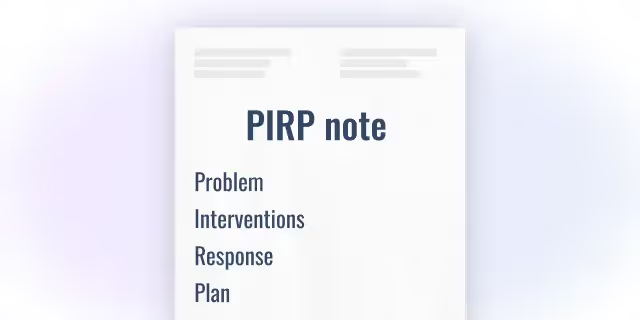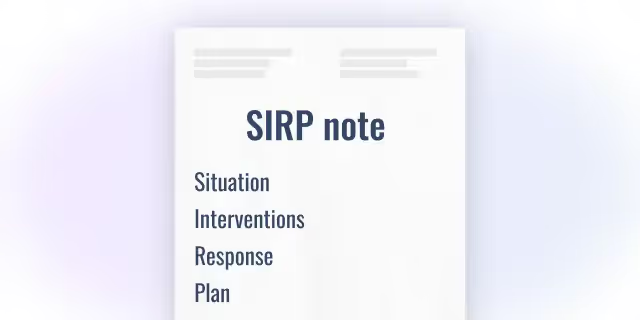Psychotherapy notes vs. progress notes: a guide to client record keeping
You’ve probably come across a lot of terms for clinical documentation including psychotherapy notes, progress notes, process notes, and private notes to name just a few.
This guide will explain what each of these terms means and in what context they should be used to help you make sure your record-keeping is compliant with industry best practices and all the necessary legal, professional, and insurance requirements.
Psychotherapy notes vs. progress notes: what’s the difference?
Keeping patient records is essential for mental health professionals. They’re needed for continuity of care and to protect practitioners in case of legal proceedings.
As a therapist, the clinical documentation you’ll be creating will fall under these two categories: psychotherapy records and psychotherapy notes.
While psychotherapy records such as progress notes are essential and required by law, psychotherapy notes are not.
We can think of psychotherapy notes as a therapist’s private notes and scribbles, while progress notes are those intended to be shared with other mental health professionals and form the client’s medical record.
What are psychotherapy notes?
Psychotherapy notes are the private notes you make during a client session and are not required to be made by law.
They are also known as private or process notes and often contain a clinician’s thoughts, impressions, and feelings about a session, along with important details and reminders to continue particular themes or topics.
They can include ideas, hunches, and questions to ask in supervision.
(If you use an AI platform like Upheal, then you’ll find that the transcript and any recordings or insights also fall under this category.)
The important thing to note is that these notes are yours only and separate from the client’s medical record; they’re not the type of information needed by, or meant to be shared with, other healthcare professionals or insurers.
About psychotherapy notes
- Psychotherapy notes are optional, private notes made by you, the therapist.
- They may be ideas, concerns for supervision, or other insights.
- They are not intended to be shared with others.
- They don’t appear in medical records.
- They can look like personal shorthand, scribbled notes, or anything that makes sense to you.
- They can be stored electronically or in a paper journal, but separately from progress notes.
- They do not have to be handed over during audits or on client requests.
- They must be specifically authorized for release, and only in response to a court order, subpoena, summons, request from a government agency, or law enforcement inquiry.
- They should be securely stored and kept confidential.
Can I share my psychotherapy notes?
HIPAA protects psychotherapy notes from view by anyone other than the counselor and anyone to whom the records are specifically authorized for release.
Since psychotherapy notes are meant for the therapist alone, they are subject to a greater degree of privacy and confidentiality.
Under HIPAA laws, even clients don’t have the right to access the therapist’s private psychotherapy notes. They can request to see them, but the therapist is under no obligation to share them. In some cases, it can be potentially harmful to share notes and this requires careful consideration.
However, you may still be required to turn these notes over due to a court order, warrant, subpoena, or summons issued by a judicial officer, a request from a government agency, or in response to a legitimate law enforcement inquiry. Companies or employers also can’t ask you to turn over psychotherapy notes during an audit of your patient records.
What are progress notes?
While psychotherapy notes are not required by law, progress notes are. They become a part of the client’s medical record.
Progress notes are HIPAA-protected and must be stored securely. Any access to the client's medical record outside of the therapist, even to other medical team providers, requires a release of information on file from the patient.
HIPAA does recognize exceptions such as when being treated within the context of the same healthcare entity, such as a hospital system, or hospital-to-hospital. Other exceptions include payment from insurance companies, or when necessary for operational workflows within the designated care system the client is in.
Apart from recording information relevant to the patient’s treatment and response to treatment, progress notes also demonstrate the efficacy of the therapist's methods for insurance purposes. It is an important way of justifying the medical necessity of the client’s continued treatment in situations where the client is using their insurance (and indeed could not be able to afford private care) and essentially provides evidence for further treatment if needed.
Finally, progress notes protect the therapist should any questions arise about the quality of care that the client has been receiving. By using a common progress note format such as the SOAP note template, for example, it’s easy to see the assessment, diagnosis, and treatment protocols, including how the clinician addressed crisis issues and processed them.
Do I need them?
If you’re a therapist who accepts insurance, progress notes are essential. Some self-pay therapists choose not to keep traditional progress notes, however, we recommend being able to provide the most up-to-date, helpful documentation, that can best support your client’s growth and progress should documentation ever be requested.
As the name hints, progress notes track a client’s progress in treatment. They contain information like the diagnosis, symptoms, medical history, test results, treatment plan, progress in sessions, prescription medication, and more.
What must be included in a progress note?
You can have a look at our helpful writing guide to progress notes if you’re looking for more detail, but the basic necessary information you must cover includes:
- Diagnosis and CPT codes (if billing for insurance)
- Symptoms
- Prognosis
- Medical history
- Progress
- Test results
- Treatment plan
- Medication and prescriptions
- Treatment modalities and frequency
- Results of clinical tests
- Date and time of service
- Provider name
Please bear in mind that the complete list of items required on your progress notes may depend on your practice, the insurance providers you work with, and state regulations. You can find many helpful templates or use Upheal’s AI note-taking platform to make sure you’re covering all the required information.
To learn about all the various progress note types and which to use when, from SOAP, DAP, BIRP, and GIRP, to EMDR and Intake templates, have a read here.
Who can request to see my clients’ progress notes?
As with psychotherapy notes, certain legal scenarios may require you to share your client's progress notes. The client’s progress notes may be requested by:
- The court – an order for documents and/or testimony may come your way (state laws vary)
- The patient and their family members
- A coroner or medical examiner
- The Department of Health and Human Services
- Insurance companies for audit and payment purposes
Don’t forget that you may need to share them with any team members involved in providing care and for any operational needs such as billing. In addition, you might also have an ethical responsibility to share progress notes if you come across life-threatening information regarding abuse or self-harm and other topics that fall under mandatory reporting laws.
As you can see, medical records can be requested by law for specific legal purposes at any point without obtaining client consent. If that is the case, you must be ready to provide them.
The notes may be brief but should include a description of the major events or topics discussed, the interventions used, any observations and assessment of the client’s status, and treatment plans for the future.
FAQs: progress notes in summary
What should be in a therapy progress note?
In summary, your observations about the client in the session, an assessment of the client's presenting problems which could include a diagnosis, and your treatment plan or steps for the future.
What is the difference between a process note and a progress note?
As described above, a process note is also known as a private note, and falls into the the psychotherapy note category. Psychotherapy notes are private notes and reflections made by a therapist for their purposes. Progress notes are meant to be shared when requested and form a part of the client’s medical record.
How long should I keep psychotherapy notes or records?
US state law typically requires that records be kept for seven years after they are created. However, the amount of time to keep records depends on state law, type of practice, insurance requirements, and client age.
What about AI platforms that help create psychotherapy records?
It’s important to familiarize yourself with each product’s policies to know how long they keep records for and how secure and HIPAA-abiding they are. Most platforms that deal with client records are HIPAA compliant, however, you can never be too careful. At Upheal, we are very transparent about processes, data, and privacy.
What if I discontinue my practice?
You remain responsible for patient records for as long as they must be kept and must take appropriate steps to make clients aware that the practice is being discontinued. Records must be safely stored and properly accessed if a client should request access. In case of disability or death, having an agreement with another mental health professional for the care of your records is advised.
More resources and concluding thoughts
We hope you found this article helpful and now understand more about the difference between psychotherapy and progress notes.
Ultimately, as a therapist, you don’t actually have to make psychotherapy notes. But if you do, know that it’s entirely up to you how you write them – scribbles, doodles, shorthand, it’s all okay, as long as it helps you remember what you need to.
When it comes to progress notes, it’s probably bad news, but yes, they are a part of the client’s medical record and you will always need to write them.
The good news is that there are helpful templates or even AI platforms like Upheal to help you draft notes faster, and more accurately, so you can spend more time on yourself or your clients.
Progress notes have a standardized format, so it’s important to capture all the data you’re supposed to as well as to familiarize yourself with your state laws and state-revised code.
For more details and guidelines on record keeping, see here. In the event of a conflict between these guidelines and any state or federal law or regulation, note that the law or regulation in question supersedes these guidelines.
The APA also has an in-depth guide, here.













